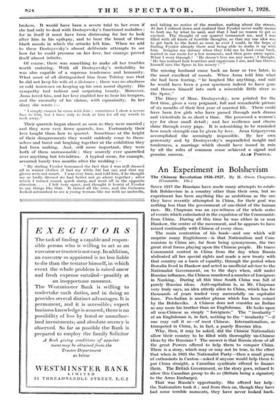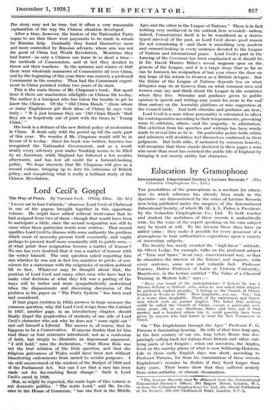An Experiment in Bolshevism
SINCE 1917 the Russians have made many attempts to estab- lish Bolshevitm in a country" otherthan their own, but :no experiment has been anything like as ambitious as the one they have recently attempted in China, for their goal was nothing less than the government of one-third of the human race. Mr. Chapman was an eye-witness of the whole series of events which culminated in the expulsion of the Communists from China. During all this 'tithe he was either in or near Hankow, the centre of the movement, and he appears to have mixed continually with Chinese of every class.
The main contention of his book--and one which will surprise .many Englishmenis that Nationalism and Com- munism in China are, far from being SynonymouS, the two great rival forces playing upon the Chinese people. He traces Communist control in China from the day when Russia abdicated all her special rights and made a new treaty with that country on a basis of equality, through the period when Borodin lived in Hankow and acted as unofficial adviser to the Nationalist Government, on to the days when, still under Russian influence, the Chinese murdered a number of foreigners in Nanking. During all this time South China was full of purely Russian ideas. Anti-capitalism is, as Mr. ChaPnian very truly says, an idea utterly alien to China, which has for thousands of years traded very successfully on capitalist lines. Pro-Indian is another phrase which has 'been- coined by the Bolsheviks. A Chinese does not consider an Indian as any more his brother than an Englishintin. He looks upon all non-Chinese as simply _" foreigner's." The " insularity Of an Englishman in fact, nothing to the " insularity "-if one may call it so—of most Chinese. InternationalisM; as trumpeted in China, is in fact, a purely Rtissian idea. 2 . Why, then; it may be asked, 'did the Chide:ie. Nationalist's allow their country to be filled with thoroughly tin-Chinese ideas by the Russians ? The answer is that AuSsia alone of all the great Powers offered to help them to Conquer China. There is a story, which may or may not be true, to the effect that when in 1925 the Nationalist-PartY-7then' a Small group of enthusiasts in Cantonasked if anyone would help thend to put China straight, a Canadian syndieate offered to finance thein. The British Goirernment, so the story goes, reftised to
allow this Canadian group to do so (Britain being a signatory to the Arms Embargo). •
- That was Russia's opportunity. She offered her help ; the Nationalists took it ; and from then on, though they haye had some terrible moments, - they have never looked back.
The story -may not be true, but it offers a very reasonable explanation of the way the Chinese situation developed.
_ After a time, however, the leaders of the Nationalist Party began to see that there were payments to be made in return for Russian help. Gradually they found themselves more and more controlled by Russian advisers, whose aim was not the good of China but World Revolution. Meantime they
had learnt—as only a Chinese can learn in so- short a time— the methods of Communism, and at last they decided to throw out their teachers. In the autumn and winter of 1927 there were wholesale massacres of Communists all over China, and by the beginning of this year there was scarcely a professed Communist in the country. Thus had the Communist experi- ment in China perished within two years of its start.
This is the main theme of Mr. Chapman's book. But apart from it there are numberless sidelights on Chinese life to-day. The author is a foreigner who has taken the trouble to get to know the Chinese. Of the " Old China Hands " (from whom so many Englishmen get their ideas of China) he says very truly : " It is just because they are Old China. Hands ' that they are so hopelessly out of joint with the times in ' Young China.' "
His book is a defence of the new British policy of moderation in China. It deals only with the period up till the early part of this year. We wonder if Mr. Chapman would still be in favour of it to-day. Since his book was written America has recognized the Nationalist Government, and as a result nearly every advisory post under Nanking seems to be filled by an American, while England has followed a few months afterwards, and has lost all credit for a forward-looking policy. We hope sincerely that Mr. Chapman will give us a second volume, bringing up to date his criticisms of British policy, and completing what is really a brilliant study of the Chinese Revolution.









































 Previous page
Previous page